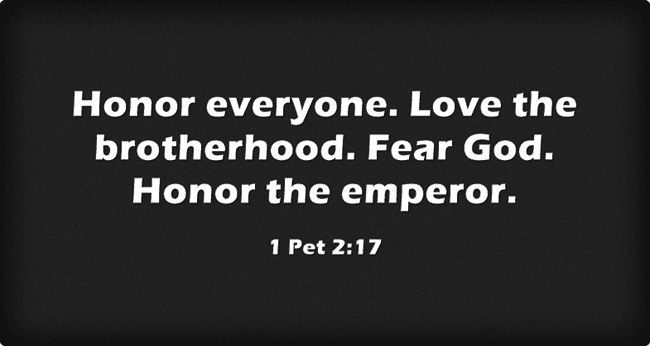Here is a Sunday school lesson or Bible study about honor from Scripture.
Honoring Others
First Peter 2:17 “Honor everyone. Love the brotherhood. Fear God. Honor the emperor.”
When the Apostle Peter wrote this, it was hard to honor an emperor who was customarily stripping Christians of their possessions, their incomes, their family, and even their lives, but Peter never qualifies this by saying “if they deserve it” any more than God’s commandment to children was to “Honor your father and your mother” (Ex 20:12) but only “if they deserve it.” Who among us deserved God’s grace? How can we not honor others when Christ endured such shame, scorn, ridicule, beatings, torture, and crucifixion for us and while still His enemies and wicked sinners (Rom 5:8, 10)? To honor someone doesn’t mean to condone their sins but only to do what God commands us to do which is to show honor to others. Everyone you will meet today has been created in the image of God (Gen 1:27), including those in the church, so honor the brothers and sisters in Christ by esteeming them as more significant than yourself (Phil 2:3), and show honor to those who are placed in authority over us (Rom 13:1-5), regardless of whether they deserve it or not.
Who is responsible for those who are in power (Dan 2:21)?
Is it hard to honor some who live dishonorably?
Do I show honor to others?
Honoring Christ
First Peter 3:14-16 “But even if you should suffer for righteousness’ sake, you will be blessed. Have no fear of them, nor be troubled, but in your hearts honor Christ the Lord as holy, always being prepared to make a defense to anyone who asks you for a reason for the hope that is in you; yet do it with gentleness and respect, having a good conscience, so that, when you are slandered, those who revile your good behavior in Christ may be put to shame.”
We can either bring honor to Jesus Christ’s righteous name or we can bring dishonor by the way we live. If our “hearts honor Christ the Lord as holy” then we’ll be honoring Christ in our bodies as living in holiness. No, not perfection, or sinless-ness, but striving for it. To honor Christ before others is to be like Christ. When Christ’s disciples asked Him something, He, like we, must “do it with gentleness and respect” but this is only possible when having a right relationship with God (“having a good conscience”).
What does it mean to have “a good conscience?”
Is it easy to dishonor the cause of Christ?
Have you seen other Christians that have dishonored Christ by their lifestyle?
Honoring Parents
Ephesians 6:2-3 “Honor your father and mother” (this is the first commandment with a promise), that it may go well with you and that you may live long in the land.”
Paul repeats the fifth commandment found in Exodus 20:12. This is the first commandment given to us that deals with horizontal relationships (humans) as the first four were vertical (toward God) so God puts the fifth commandment as the very first commandment given us as relating to our human relationships. God must have a purpose for putting it as the first for human-to-human relationships. If this commandment is obeyed by children, then they’re less likely as adults to break the following five commandments. This commandment was the first commandment given with a promise; “that you may live long in the land” or have a longer life. There is a cause and effect with this law that speaks of a shorter life for disobedience but a longer live for the obedient. And this commandment doesn’t say to honor your father and mother “if they did a good job of parenting” or “if they were godly parents” but is simply says “honor your father and mother.” There are no qualifiers to this commandment.
How can a longer life result from obeying parents?
How might a shorter life come from disobeying or not honor your parents?
Can you still honor your parents if they’re deceased?
A Place of Honor
Luke 14:8-9 “When you are invited by someone to a wedding feast, do not sit down in a place of honor, lest someone more distinguished than you be invited by him, and he who invited you both will come and say to you, ‘Give your place to this person,’ and then you will begin with shame to take the lowest place.”
Jesus is trying to teach His disciples to stay humble in all circumstances. Jesus frequently taught that “Whoever exalts himself will be humbled, and whoever humbles himself will be exalted” (Matt 23:2) but the exalting may not come in this life but in the life to come. Until then, we should seek to be lowly, humble, and contrite, which is the opposite of the pride-filled, self-righteous who “love the place of honor at feasts and the best seats in the synagogues” (Matt 23:6). It’s better to esteem others better than ourselves (Phil 2:3) so that “when you are invited, go and sit in the lowest place, so that when your host comes he may say to you, ‘Friend, move up higher.’ Then you will be honored in the presence of all who sit at table with you. For everyone who exalts himself will be humbled, and he who humbles himself will be exalted” (Luke 14:10-11).
Have you ever been told you have to move at a banquet, wedding, or funeral?
How did that feel?
Is it better to err on the side on “the lowest place” than on “a place of honor?”
Conclusion
I urge you in your study to look at all of the Bible verses and read them aloud in the class so that you can get the most out of this lesson about honor. Do you see more clearly now that we are to honor everyone we come into contact with, despite whether they deserve it or not? Shouldn’t we also honor those who are in the household of God, whether they deserve it or not? And finally those that God has sovereignly placed in authority over us should be given honor and only when God’s higher, moral law is broken (Acts 5:29), we must obey those in authority (Rom 12). Knowing this should help us understand these verses better where Paul commands Timothy “that supplications, prayers, intercessions, and thanksgivings be made for all people, for kings and all who are in high positions, that we may lead a peaceful and quiet life, godly and dignified in every way” (1st Tim 2:1-2). With a “peaceful and quiet life,” we’ll be allowed to share the gospel more easily. The Apostle Peter writes about what an honor we have to believe in Jesus Christ in 1st Peter 2:6-7: “For it stands in Scripture; Behold, I am laying in Zion a stone, a cornerstone chosen and precious and whoever believes in him will not be put to shame. So the honor is for you who believe, but for those who do not believe. The stone that the builders rejected has become the cornerstone.”
How hard is it to honor politicians, the mayor, or the president?
Are we to honor only those who deserve it?
What have you learned about honor as written about in the Bible?
Article by Jack Wellman
Jack Wellman is Pastor of the Mulvane Brethren Church in Mulvane Kansas. Jack is also the Senior Writer at What Christians Want To Know whose mission is to equip, encourage, and energize Christians and to address questions about the believer’s daily walk with God and the Bible. You can follow Jack on Google Plus or check out his book Teaching Children the Gospel available on Amazon.
















